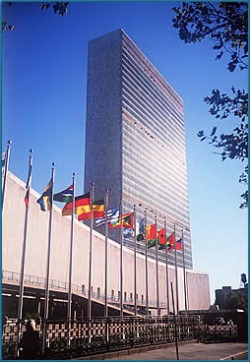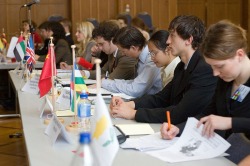What is the United Nations and how is MUN related to it?

The United Nations Organization (UNO) or simply United Nations (UN) is an international organization whose stated aims are facilitating cooperation in international law, international security, economic development, social progress, human rights, and the achieving of world peace. The UN was founded in 1945 after World War II to replace the League of Nations, to stop wars between countries, and to provide a platform for dialogue. It contains multiple subsidiary organizations to carry out its missions.
There are currently 192 member states, including nearly every sovereign state in the world. From its offices around the world, the UN and its specialized agencies decide on substantive and administrative issues in regular meetings held throughout the year. The organization has six principal organs: the General Assembly (the main deliberative assembly); the Security Council (for deciding certain resolutions for peace and security); the Economic and Social Council (for assisting in promoting international economic and social cooperation and development); the Secretariat (for providing studies, information, and facilities needed by the UN); the International Court of Justice (the primary judicial organ); and the United Nations Trusteeship Council (which is currently inactive). Other prominent UN System agencies include the World Health Organization (WHO), the World Food Programme (WFP) and United Nations Children's Fund (UNICEF). The UN's most visible public figure is the Secretary-General, currently Ban Ki-moon of South Korea, who attained the post in 2007. The organization is financed from assessed and voluntary contributions from its member states, and has six official languages: Arabic, Chinese, English, French, Russian and Spanish.
There are currently 192 member states, including nearly every sovereign state in the world. From its offices around the world, the UN and its specialized agencies decide on substantive and administrative issues in regular meetings held throughout the year. The organization has six principal organs: the General Assembly (the main deliberative assembly); the Security Council (for deciding certain resolutions for peace and security); the Economic and Social Council (for assisting in promoting international economic and social cooperation and development); the Secretariat (for providing studies, information, and facilities needed by the UN); the International Court of Justice (the primary judicial organ); and the United Nations Trusteeship Council (which is currently inactive). Other prominent UN System agencies include the World Health Organization (WHO), the World Food Programme (WFP) and United Nations Children's Fund (UNICEF). The UN's most visible public figure is the Secretary-General, currently Ban Ki-moon of South Korea, who attained the post in 2007. The organization is financed from assessed and voluntary contributions from its member states, and has six official languages: Arabic, Chinese, English, French, Russian and Spanish.

Model United Nations (also Model UN or MUN) is an academic simulation of the United Nations that aims to educate participants about civics, current events, effective communication, globalization and multilateral diplomacy. In standard Model UN, students take on roles as diplomats and participate in a simulated session of an intergovernmental organization (IGO). Participants research a country, take on roles as diplomats, investigate international issues, debate, deliberate, consult, and then develop solutions to world problems. More recently, simulation of other deliberative bodies, such as the United States National Security Council, has been included in Model United Nations, even if they are completely unrelated to the UN or international affairs as a whole.
During a conference, participants must employ a variety of communication and critical thinking skills in order to represent the policies of their country. These skills include public speaking, group communication, research, policy analysis, active listening, negotiating, conflict resolution, note taking, and technical writing. However, school delegation formats vary from region to region.
Most Model UNs are simulations of a body in the United Nations system, such as:
Model UNs are often run using basic parliamentary procedure. This allows all delegates to be active participants. Common activities in MUN involve giving speeches to the committee and writing resolutions concerning a given topic. Additionally, at the end of longer conferences, awards are commonly given to either individual delegates, delegations, or both. The judging of this varies. Giving awards is less common at smaller conferences. In addition, many larger conferences do not give awards at all, feeling that competition detracts from the simulation experience.
During a conference, participants must employ a variety of communication and critical thinking skills in order to represent the policies of their country. These skills include public speaking, group communication, research, policy analysis, active listening, negotiating, conflict resolution, note taking, and technical writing. However, school delegation formats vary from region to region.
Most Model UNs are simulations of a body in the United Nations system, such as:
- The General Assembly in both plenary form and within its functional committees
- Economic and Social Council and its specialized councils and agencies
- Security Council
- United Nations Children's Fund
- United Nations Environment Programme
- United Nations Development Programme
- UNESCO
- Human Rights Council
- Disarmament Committee
- United Nations High Commission for Refugees
- World Food Program
- World Health Organization
- World Trade Organization
Model UNs are often run using basic parliamentary procedure. This allows all delegates to be active participants. Common activities in MUN involve giving speeches to the committee and writing resolutions concerning a given topic. Additionally, at the end of longer conferences, awards are commonly given to either individual delegates, delegations, or both. The judging of this varies. Giving awards is less common at smaller conferences. In addition, many larger conferences do not give awards at all, feeling that competition detracts from the simulation experience.
